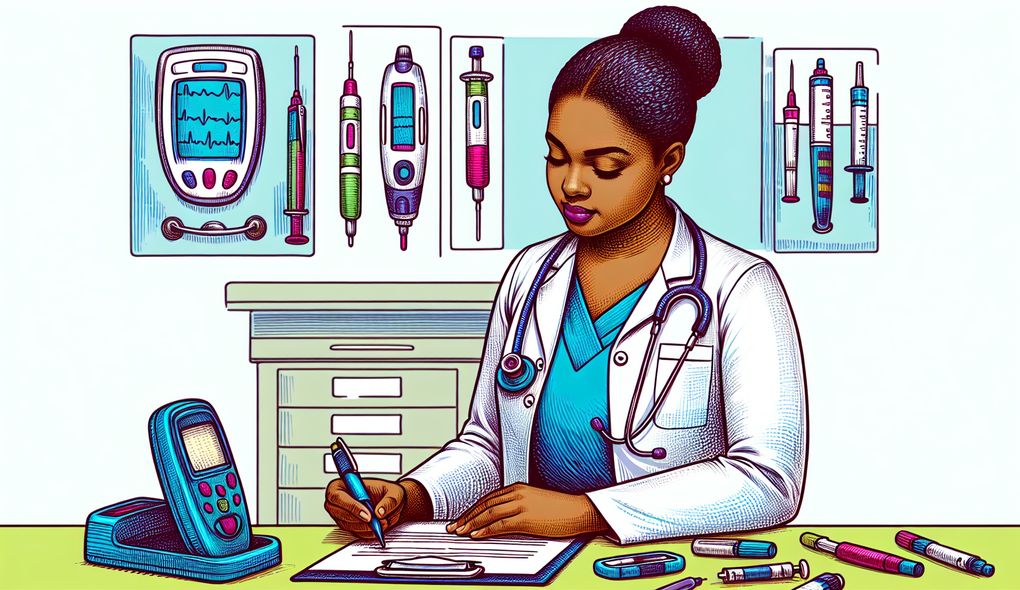Can you explain how you interpret diagnostic tests and lab results related to endocrine function?
INTERMEDIATE LEVEL

Sample answer to the question:
When interpreting diagnostic tests and lab results related to endocrine function, I carefully review the data and compare it to the normal ranges for each specific test. I pay close attention to any abnormalities or trends that may be indicative of endocrine disorders. I also consider the patient's symptoms and medical history to help make an accurate interpretation. Additionally, I collaborate with other healthcare professionals, such as endocrinologists and lab technicians, to ensure a comprehensive understanding of the results. Overall, my goal is to use the information provided by the diagnostic tests and lab results to guide the diagnosis and treatment of endocrine conditions.
Here is a more solid answer:
When it comes to interpreting diagnostic tests and lab results related to endocrine function, I have a well-defined process. First, I carefully review the results and compare them to the established normal ranges. I pay particular attention to any abnormalities or trends that might indicate endocrine disorders. Next, I consider the patient's symptoms, medical history, and any other relevant information to help me make an accurate interpretation. For example, if a patient has been experiencing weight gain, fatigue, and cold intolerance, and their lab results show elevated TSH levels and decreased free T4 levels, it suggests hypothyroidism. I also collaborate with other healthcare professionals, such as endocrinologists and lab technicians, to ensure a comprehensive understanding of the results. This collaborative approach enables me to make well-informed clinical decisions and develop appropriate treatment plans. Additionally, I rely on my strong medical knowledge in endocrinology to interpret the test results accurately. I stay up-to-date with the latest research and advancements in the field to provide the best possible care for my patients. Finally, patient education is a crucial part of my role. I explain the significance of the test results to patients, provide them with clear instructions, and address any concerns or questions they may have. By empowering patients with knowledge, I help them actively participate in their treatment and improve their overall well-being.
Why is this a more solid answer?
The solid answer provides specific details about the candidate's process of interpreting diagnostic tests and lab results related to endocrine function. It includes an example that demonstrates the candidate's clinical decision-making skills. The answer also emphasizes the candidate's collaboration with healthcare professionals and their commitment to staying up-to-date with medical knowledge. However, it could be improved by providing more examples of relevant cases or situations the candidate has encountered in their previous experience.
An example of a exceptional answer:
Interpreting diagnostic tests and lab results related to endocrine function is a critical and complex task that requires a comprehensive approach. I follow a well-defined process to ensure accurate interpretation. Firstly, I meticulously review the results, comparing them to established normal ranges. However, it's important to consider that endocrine conditions can sometimes present with results that are within the normal range, so I rely on my clinical experience and knowledge to identify any subtle deviations that may indicate an underlying issue. For instance, a patient may have slightly elevated fasting blood glucose levels, which are within the normal range, but when combined with symptoms such as increased thirst and frequent urination, it suggests the possibility of early-stage diabetes. To further support my interpretation, I collaborate closely with endocrinologists, lab technicians, and other healthcare professionals. This collaboration allows for a multidisciplinary approach, where we discuss and analyze the results together, taking into account the patient's unique circumstances. To enhance my expertise and keep up with advancements in endocrinology, I regularly attend conferences, participate in webinars, and read relevant research publications. In addition to accurate interpretation, patient education is crucial. I take the time to explain the meaning of the results, address any concerns or misconceptions, and design personalized care plans. By equipping patients with knowledge and involving them in decision-making, I foster an environment of trust, collaboration, and shared responsibility. Overall, my goal is to provide the highest standard of care by combining medical expertise, collaboration, and patient empowerment.
Why is this an exceptional answer?
The exceptional answer demonstrates a deep understanding of the complexity of interpreting diagnostic tests and lab results related to endocrine function. The candidate's process is thorough and takes into account the challenging nature of diagnosing endocrine conditions. The answer includes a specific example that showcases the candidate's clinical experience and expertise. The emphasis on collaboration with healthcare professionals and the commitment to ongoing education and learning in the field of endocrinology is commendable. Additionally, the answer highlights the importance of patient education and empowerment. This exceptional answer effectively encompasses all the evaluation areas of diagnostic interpretation, clinical decision-making, collaboration with healthcare professionals, medical knowledge, and patient education.
How to prepare for this question:
- Familiarize yourself with the normal ranges of common endocrine tests such as TSH, free T4, cortisol, and HbA1c.
- Stay updated with the latest research and advancements in the field of endocrinology through conferences, webinars, and research publications.
- Seek opportunities to collaborate with other healthcare professionals in order to gain insights and perspectives from different specialties.
- Develop strong clinical decision-making skills by reviewing case studies and practicing interpreting lab results.
- Improve your patient education abilities by practicing clear and concise communication, using layman's terms to explain complex medical concepts.
What are interviewers evaluating with this question?
- Diagnostic interpretation
- Clinical decision-making
- Collaboration with healthcare professionals
- Medical knowledge
- Patient education

